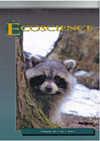毛毡终条(Terminalia tomentosa)物候与再生状况wright & Arn。:一种产于印度森林的热带树种
IF 1.3
4区 环境科学与生态学
Q3 ECOLOGY
引用次数: 1
摘要
摘要毛冬青(Roxb.)Wight&Arn。,作为印度热带森林中的一种重要树种,据报道,该国许多地区的树木再生较差或没有再生。本研究旨在评估Similipal生物圈保护区三种不同森林类型中该物种的种群结构和再生状况,以及连续两年的酚类行为。叶片发育与果实衰老呈正相关(r=0.76,p<0.01),与花发育呈正相关(r=0.63,p<0.01),主成分分析表明,一个月的最高气温和降雨量是季风前事件(叶片衰老和果实衰老)和季风后事件(叶片和果实的生长和成熟)的主要因素。结果还表明,毛白杨的再生失败不是由于酚学强度的原因,而是由于果实成熟的酚学时机不对。对毛白杨的再生状况和酚类信息的研究有助于制定该热带树种在其自然生态系统中的保护和管理策略。本文章由计算机程序翻译,如有差异,请以英文原文为准。
Phenology and Regeneration Status of Terminalia tomentosa (Roxb.) Wight & Arn.: A Tropical Tree Species of Indian Forests
ABSTRACT Terminalia tomentosa (Roxb.) Wight & Arn., an important tree species in the tropical forests of India, is often reported to have poor or no regeneration in many parts of the country. The present study was conducted to evaluate the population structure and regeneration status of the species in three different forest types of the Similipal Biosphere Reserve, along with phenological behaviours for two consecutive years. Leaf initiation was positively correlated with fruit senescence (r = 0.76, p < 0.01) and flower initiation (r = 0.63, p < 0.01). However, a negative correlation was found between leaf initiation (LF2) and leaf senescence (LF5) (r = –0.42, p < 0.05). Principal Component Analysis showed that maximum temperature and rainfall in a given month are the main factors for pre-monsoon events (leaf senescence and fruit senescence) and post-monsoon events (growth and maturation of leaves and fruits). The results also revealed that regeneration failure of T. tomentosa was not due to phenological intensity but possibly to wrong phenological timing of fruit maturation. This study on regeneration status and phenological information of T. tomentosa could help develop strategies for conservation and management of this tropical tree species in its natural ecosystem.
求助全文
通过发布文献求助,成功后即可免费获取论文全文。
去求助
来源期刊

Ecoscience
环境科学-生态学
CiteScore
2.80
自引率
0.00%
发文量
13
审稿时长
>36 weeks
期刊介绍:
Écoscience, is a multidisciplinary journal that covers all aspects of ecology. The journal welcomes submissions in English or French and publishes original work focusing on patterns and processes at various temporal and spatial scales across different levels of biological organization. Articles include original research, brief communications and reviews.
 求助内容:
求助内容: 应助结果提醒方式:
应助结果提醒方式:


